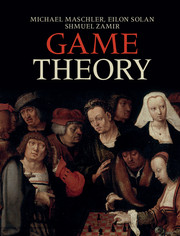Book contents
- Frontmatter
- Contents
- Acknowledgments
- Notations
- Introduction
- 1 The game of chess
- 2 Utility theory
- 3 Extensive-form games
- 4 Strategic-form games
- 5 Mixed strategies
- 6 Behavior strategies and Kuhn's Theorem
- 7 Equilibrium refinements
- 8 Correlated equilibria
- 9 Games with incomplete information and common priors
- 10 Games with incomplete information: the general model
- 11 The universal belief space
- 12 Auctions
- 13 Repeated games
- 14 Repeated games with vector payoffs
- 15 Bargaining games
- 16 Coalitional games with transferable utility
- 17 The core
- 18 The Shapley value
- 19 The bargaining set
- 20 The nucleolus
- 21 Social choice
- 22 Stable matching
- 23 Appendices
- References
- Index
6 - Behavior strategies and Kuhn's Theorem
- Frontmatter
- Contents
- Acknowledgments
- Notations
- Introduction
- 1 The game of chess
- 2 Utility theory
- 3 Extensive-form games
- 4 Strategic-form games
- 5 Mixed strategies
- 6 Behavior strategies and Kuhn's Theorem
- 7 Equilibrium refinements
- 8 Correlated equilibria
- 9 Games with incomplete information and common priors
- 10 Games with incomplete information: the general model
- 11 The universal belief space
- 12 Auctions
- 13 Repeated games
- 14 Repeated games with vector payoffs
- 15 Bargaining games
- 16 Coalitional games with transferable utility
- 17 The core
- 18 The Shapley value
- 19 The bargaining set
- 20 The nucleolus
- 21 Social choice
- 22 Stable matching
- 23 Appendices
- References
- Index
Summary
Chapter summary
In strategic-form games, a mixed strategy extends the player's possibilities by allowing him to choose a pure strategy randomly. In extensive-form games random choices can be executed in two ways. The player can randomly choose a pure strategy for the whole play at the outset of the game; this type of randomization yields in fact the concept of mixed strategy in an extensive-form game. Alternatively, at every one of his information sets, the player can randomly choose one of his available actions; this type of randomization yields the concept of behavior strategy, which is the subject of this chapter.
We study the relationship between behavior strategies and mixed strategies in extensive-form games. To this end we define an equivalence relation between strategies and we show by examples that there are games in which some mixed strategies do not have equivalent behavior strategies, and there are games in which some behavior strategies do not have equivalent mixed strategies. We then introduce the concept of perfect recall: a player has perfect recall in an extensive-form game if along the play of the game he does not forget any information that he knew in the past (regarding his moves, the other players' moves, or chance moves). We prove Kuhn's Theorem, which states that if a player has perfect recall, then any one of his behavior strategies is equivalent to a mixed strategy, and vice versa.
- Type
- Chapter
- Information
- Game Theory , pp. 219 - 250Publisher: Cambridge University PressPrint publication year: 2013



